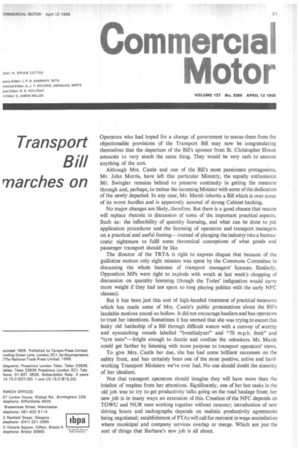Transport Bill marches on
Page 23

If you've noticed an error in this article please click here to report it so we can fix it.
Operators who had hoped for a change of government to rescue them from the objectionable provisions of the Transport Bill may now be congratulating themselves that the departure of the Bill's sponsor from St. Christopher House amounts to very much the same thing. They would be very rash to assume anything of the sort.
Although Mrs. Castle and one of the Bill's most passionate protagonists, Mr. John Morris, have left this particular Ministry, the equally enthusiastic Mr. Swingler remains behind to preserve continuity in getting the measure through and, perhaps, to imbue the incoming Minister with some of the dedication of the newly departed. In any case, Mr. Marsh inherits a Bill which is over some of its worst hurdles and is apparently assured of strong Cabinet backing.
No major changes are likely, therefore. But there is a good chance that reason will replace rhetoric in discussion of some of the important practical aspects. Such as: the inflexibility of quantity licensing, and what can be done to put application procedures and the licensing of operators and transport managers on a practical and useful footing—instead of plunging the industry into a bureaucratic nightmare to fulfil some theoretical conceptions of what goods and passenger transport should be like.
The director of the TRTA is right to express disgust that because of the guillotine motion only eight minutes was spent by the Commons Committee in discussing the whole business of transport managers' licences. Similarly, Opposition MPs were right to explode with wrath at last week's chopping of discussion on quantity licensing (though the Tories' indignation would carry more weight if they had not spent so long playing politics with the early NFC clauses).
But it has been just this sort of high-handed treatment of practical measures which has made some of Mrs. Castle's public protestations about the Bill's laudable motives sound so hollow. It did not encourage hauliers and bus operators to trust her intentions. Sometimes it has seemed that she was trying to escort this leaky old battleship of a Bill through difficult waters with a convoy of worthy and eyecatching vessels labelled "breathalyzer" and "70 m.p.h. limit" and "tyre tests"—bright enough to dazzle and confuse the onlookers. Mr. Marsh could get farther by listening with more purpose to transport operators' views.
To give Mrs. Castle her due, she has had some brilliant successes on the safety front, and has certainly been one of the most positive, active and hardworking Transport Ministers we've ever had. No one should doubt the sincerity of her idealism.
Not that transport operators should imagine they will have more than the briefest of respites from her attentions. Significantly, one of her last tasks in the old job was to try to get productivity talks going on the road haulage front; her new job is in many ways an extension of this. Creation of the NFC depends on TGWU and NUR men working together without rancour; introduction of new driving hours and tachographs depends on realistic productivity agreements being negotiated; establishment of PTAs will call for restraint in wage-assimilation where municipal and company services overlap or merge. Which are just the sort of things that Barbara's new job is all about.




































































































